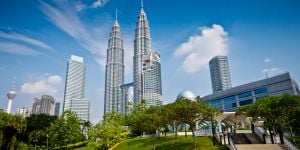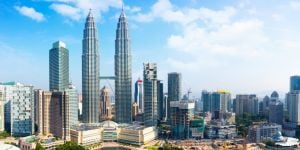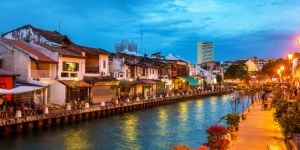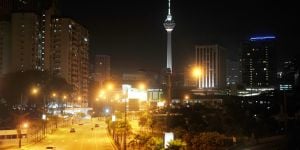
Kuala Lumpur is a fast-paced city, where work is often at the heart of people's lives. As Malaysia's most populous and dynamic megalopolis, the city has no shortage of opportunities. Thus, KL remains the country's main magnet for expatriate professionals who are looking for work. New talents and skills are therefore always in demand by numerous local companies.
Obviously, those with ambition and dynamism thrive rapidly in a city like Kuala Lumpur. Foreigners who work in the city are either hired remotely or are transferred from a foreign office to the one in KL. If you still cannot find a job yet when moving to Kuala Lumpur, the following tips might be useful. As a matter of fact, working and doing business in Malaysia is highly dependent on contacts and networking; trust and loyalty are highly valued in both professional and private settings.
Knowing this, one can understand that it could be difficult for a foreigner to find a job in Kuala Lumpur, especially if they don't already have some professional or social track record in the country. Generally, employees stay within the same company for a long time and employers are more inclined to hire someone who is willing to grow with the enterprise over time. That is why enacting your professional network is essential in Kuala Lumpur, more importantly, so if you are not from the country and want to work in KL. Thankfully, there are many ways to access professional opportunities for expatriates if they follow a few simple rules and standards.
Social networks are a great place to start when looking for a job in Malaysia. As a matter of fact, in this country, those who work in diverse professional sectors create dedicated groups on social media with the aim of developing new contacts and establishing networks. These groups are thus, a great way to get to know those who work in your line of business in KL and get yourself noticed and known. Employers even publish job postings on these groups sometimes. This can eventually help at saving you a long search.
As previously stated, doing business in Malaysia will require some relational investment on the part of expats, especially if they did not get a job before arriving in the country. So, starting your own network or laying the foundation for new networks before you move in will definitely help you find a job in KL. Let it be known that you are looking to move into Kuala Lumpur. You might end up finding opportunities by simple word of mouth. Besides, being recommended for a position will give you a definite advantage compared to other candidates.
One of the most worthwhile ways to find out about available job openings in KL is probably by visiting local recruitment agencies' websites. Several of them advertise online numerous job opportunities, in Kuala Lumpur or elsewhere. The most respected ones which are also the most visited ones by job seekers in Kuala Lumpur, include Jobstreet, Indeed.com, Glassdoor, Monster or Jobstore. Browsing these job search sites will allow you to refine your searches according to your favorite line of business, the position you are looking for, or your salary expectations.
Another effective solution for finding work in the city is to contact a local recruitment agency. There are many of them in Kuala Lumpur. And often, when seeking expat services, local businesses call on them to provide an inventory of potential candidates, prior to determining a shortlist of the best of them.
Every year, universities and campuses organize job fairs and workshops. These events allow international students to have access to potential employers and to companies that might lead to job offers at the end of their studies. Other job fairs are also held outside of Kuala Lumpur's academic institutions. Such events give access to an even wider range of employers. Be aware, however, that many of the employers participating in such events may not be looking to hire expats, as they need to obtain a work permit in Malaysia beforehand.
In order to maximize your chances of getting your dream job in KL, it is important that you invest in improving your resume, cover letters and any other additional documents, like your transcripts, etc. These documents will need to be translated into English for employers if they are not already. Since the labour market is extremely competitive in KL, this means that employers will be looking for candidates who stand out. Such an outcome can be achieved by working on these documents and your skills before you go to your job interviews.
Job opportunities in Kuala Lumpur
Being the most developed city in Malaysia, Kuala Lumpur also homes the largest number of companies within it. In that same vein, it is the place where one can expect to find the largest number of job opportunities that encompass a wide range of business sectors. According to Jobstreet, information technology and software development, digital marketing, financial services, business development, and healthcare services are recognized to be the most labor-demanding sectors in KL in 2022. Likewise, project managers, customer managers and educators should not have major worries about finding a job on site quickly.
The technology and telecommunications sector is to date, undoubtedly the largest employment hub, not only in Kuala Lumpur but also in the whole of Malaysia. The government is encouraging the digitalization of many services through various favorable measures for companies entering this sector and facilitating the employment of local or foreign workers. If you have IT expertise and some experience in the field, you can almost be sure to find a good position in one of the numerous startups and/or larger local or international companies based in Malaysia, that specialize in this sector.
In Malaysia, there is now a very large number of start-ups that specialize in various digital fields. Most of them are based in Kuala Lumpur or in the immediate vicinity of the city, like in Klang Valley, or Greater Kuala Lumpur. This phenomenon is a direct result of the government's resolve. In 2021, the number of startups in Malaysia was estimated at around 3,000. The digitalization of many public, parastatal and private service institutions is a real gateway to opportunities in Malaysia. In fact, Malaysia's digital revolution is affecting telecommunications, services, healthcare, administration, commerce, finance, banking, insurance, communication, journalism, research, archiving, video games, application development and many other sectors.
Considering such a strong potential for growth, the Malaysian government has invested heavily in the development of a national digital economy. Facilities for the creation of start-ups have consequently been put up. In 2021, the Government of Malaysia launched the Malaysian Digital Economy Blueprint, a long-term strategy to make the country a global platform for the development of start-ups. This strategy has already paid off: in its Global Startup Ecosystem Report (2020), the international organization Startup Genome cites Kuala Lumpur as an attractive destination for startups.
You should also know that expertise is a major asset for those looking to get a job in Kuala Lumpur. For example, demand is very high on the local labour market for civil engineering graduates, medical specialists (especially surgeons and cardiologists) and other academics. A master's degree, a doctorate or extensive experience in the most demanding sectors is an open door to a well-paid job with many possible perks, such as a vehicle, official accommodation, and many other facilities.
Besides, hybrid skills and professional agility are increasingly in demand in Malaysia, especially within the largest Kuala Lumpur-based companies. Consequently, professionals who can master multiple skills in one and display great aptitude for adaptation to multiple constraints and work environments will see their degree of employability greatly upgraded.
Lastly, one of the main sources of expatriate jobs in Malaysia is large international companies established in the country. For your information, there exist at least 5,000 local companies launched by multinationals that originate from 40 countries. Most of them, like for instance Accenture, Ernst & Young, PricewaterhouseCoopers (PwC), Deloitte, IBM, KPMG, Citi, HSBC, DXC Technologies and Dell Technologies, amongst others, are located in Kuala Lumpur. The available job offers are mostly posted directly on the companies' local branch websites, but they can also be viewed on the local job search sites.
Prerequisites for employing expatriates in Kuala Lumpur
Despite a large number of available professional opportunities, it should be noted that, in Kuala Lumpur like anywhere else in the country, not all sectors of professional activity are open to foreigners. Local authorities are committed to preserving local employment as much as possible. As such, they do not always welcome the fact that an expatriate could be preferred to a Malaysian national if the latter has the necessary skills for the same position. Very often, companies that employ foreigners must be able to justify having favoured an expatriate rather than a Malaysian in certain positions, and this is even mandatory in some sectors.
Hence, the authorities have drawn up a list of professions and sectors of activity to which expatriates in Malaysia are not entitled. This list can be found on the website of the Department of Immigration of Malaysia. The Malaysian government's policy of preserving local employment has allowed the country to maintain a very low national unemployment rate over the past 20 years. This rate is currently around 3.3%.
Finally, be aware that working in Malaysia strictly requires you to hold a work permit if you are not a Malaysian national. There are different types: the Employment Pass, the Temporary Employment Pass, and the Professional Visit Pass. Each of these permits is intended for specific categories of professionals and activities in the territory. To learn more, check out our article on work permits in Malaysia.
Useful links:
Lists of Chambers of Commerce and Entrepreneurship Commissions
We do our best to provide accurate and up to date information. However, if you have noticed any inaccuracies in this article, please let us know in the comments section below.












Comments